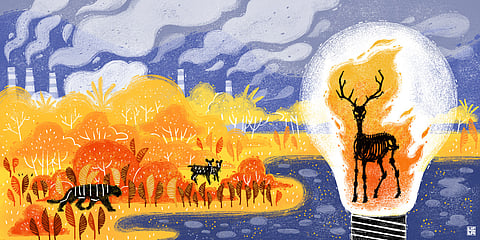Thirst for energy
(This article is part of our special series 'Rethinking Bangladesh'. You can read the editorial note to the series here.)
Bangladesh is now officially scheduled to be classified as a developing country in 2026. The United Nations General Assembly at its 76th session adopted a historic resolution to graduate the country from the least-developed stage to the developing stage. This recognition of development came when the country was preparing to celebrate the golden jubilee of its independence. While power generation and supply are considered the driving factors behind this development process, the country's development journey is not above criticism.
Environmentally harmful fossil fuels have been the main source of power generation in Bangladesh: almost two-thirds of the country's power production depends on natural gas, while the rest comes from coal, liquid fuel and hydropower. The Power System Master Plan (PSMP) adopted in 2016 indicates a growing dependency on fossil fuels in the coming days, which contradicts the global call to "consign coal power to history" to keep the 1.5-degree-Celsius target within reach. It is also inconsistent with the pledges Bangladesh made as a signatory of the Paris Accords, as a leader of the Climate Vulnerable Forum (CVF), and as a proponent of the Mujib Climate Prosperity Plan (MCCP) to the global community at the 26th United Nations Climate Change Conference (COP26).

